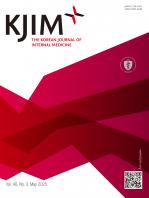|
Erratum
Effect of omalizumab as add-on therapy to Quality of Life Questionnaire for Korean Asthmatics (KAQLQ) in Korean patients with severe persistent allergic asthma
Jae-Woo Jung, Hae-Sim Park, Choon-Sik Park, Sang-Heon Cho, Inseon S. Choi, Hee-Bom Moon, Soon Seog Kwon, Ho Joo Yoon, Jung Won Park, Jong-Myung Lee, Dong-Chull Choi, Byoung Whui Choi
Korean J Intern Med. 2021;36(5):1260 Published online September 1, 2021
|
|
|
Allergy / Original Article
Effect of omalizumab as add-on therapy to Quality of Life Questionnaire for Korean Asthmatics (KAQLQ) in Korean patients with severe persistent allergic asthma
[corrected-article]
Jae-Woo Jung, Hae-Sim Park, Choon-Sik Park, Sang-Heon Cho, Inseon S. Choi, Hee-Bom Moon, Soon Seog Kwon, Ho Joo Yoon, Jung Won Park, Jong-Myung Lee, Dong-Chull Choi, Byoung Whui Choi
Korean J Intern Med. 2021;36(4):1001-1013. Published online June 1, 2021
Background/Aims: Omalizumab is the first biologic known to be effective in patients with severe allergic asthma.
Methods: This study was conducted as a multicenter, single-group, open trial to evaluate the improvement in the quality of life with the additional administration of omalizumab for 24 w..
|
|
|
Original Article
Causes and Treatment Outcomes of Stevens-Johnson Syndrome and Toxic Epidermal Necrolysis in 82 Adult Patients
Hye-In Kim, Shin-Woo Kim, Ga-Young Park, Eu-Gene Kwon, Hyo-Hoon Kim, Ju-Young Jeong, Hyun-Ha Chang, Jong-Myung Lee, Neung-Su Kim
Korean J Intern Med. 2012;27(2):203-210. Published online May 31, 2012
Background/AimsStevens-Johnson syndrome (SJS) and toxic epidermal necrolysis (TEN) are predominantly known as medication-induced diseases. However, at our institution, we have experienced more cases of non-drug-related SJS and TEN than expected. Therefore, we studied the diffe..
|
|
|
Original Article
The Causes and Treatment Outcomes of 91 Patients with Adult Nosocomial Meningitis
Hye-In Kim, Shin-Woo Kim, Ga-Young Park, Eu-Gene Kwon, Hyo-Hoon Kim, Ju-Young Jeong, Hyun-Ha Chang, Jong-Myung Lee, Neung-Su Kim
Korean J Intern Med. 2012;27(2):171-179. Published online May 31, 2012
Background/AimsFrequent pathogens of nosocomial meningitis were investigated and the adequacy of empiric antibiotic therapy was assessed. Outcomes of nosocomial meningitis were also evaluated. MethodsNinety-one patients, who were diagnosed and t..
|
|
|
















